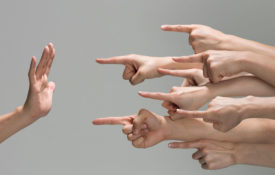-
Are AI Faces ‘More Human’ Than Real Ones? See if You Can Tell the Difference
Face the facts. AI-generated faces look more “real” than some humans, according to a new study — at least, when it comes to white people. Published in the Psychological Science journal this week, researchers found that AI could reliably fool people into thinking that computer-generated faces look more real than a photograph.
-

Substance-Use Stigma Impedes Treatment in Various Ways, Scientists Say
Addiction is one of society’s most misunderstood and rebuked health conditions. That stigma discourages many people from seeking treatment for substance dependence, according to a new report published in Psychological Science in the Public Interest.
-
Feeling Lonely? Your Brain May Process the World Differently
The U.S. is in the midst of a loneliness epidemic. For a lot of people, the feeling is even more pronounced during the holidays. In addition to the emotional impact of chronic loneliness, it has some dramatic health consequences: increased risk of heart disease and stroke, infections, cancer, even death. Recent research also suggests that loneliness can change the way the brain processes the surrounding world. ...
-
Which Is Better, Active Learning or Lecture? It’s Not So Simple.
Students whose STEM courses are taught using active learning perform better than those taught with traditional lectures. That was the top-line finding of a widely cited 2014 meta-analysis, and it has been borne out in many other studies since. While research suggests that lecturing remains the dominant form of STEM instruction, the studies on active learning have bolstered high-profile calls for change that a growing number of instructors have taken to heart in recent years. A new paper suggests, however, that those studies are not as solid, nor their findings as clear-cut, as active-learning proponents would like.
-
What Most American Schools Do Wrong
Which country has the best education system? Since 2000, every three years, 15-year-olds in dozens of countries have taken the Program for International Student Assessment — a standardized test of math, reading and science skills. On the inaugural test, which focused on reading, the top country came as a big surprise: tiny Finland. Finnish students claimed victory again in 2003 (when the focus was on math) and 2006 (when it was on science), all while spending about the same time on homework per week as the typical teenager in Shanghai does in a single day. Just over a decade later, Europe had a new champion.
-

Guilty as Charged: How We Contribute to Polarizing Content on Social Media
Podcast: Steven Rathje (New York University) and APS’s Özge G. Fischer-Baum explore the implications for societal change, in-group and out-group behavior, and emotional choices on internet usage.

